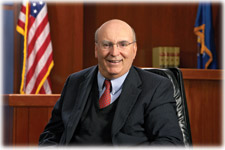 Wisconsin Lawyer
Wisconsin Lawyer
Vol. 79, No. 9, September
2006
Changing the Bar
A roadmap to changing the bar, the courts, and the justice system
over the next decade consists of three parts - internal participation,
external pressure, and the political system.

by Steve
Levine
The night after being sworn in as State Bar president, I had a dream.
(This was not unusual, because many of my ideas about the legal/judicial
system have been greeted with the response, "You've got to be
dreaming!".) During the dream, Bar membership instantaneously became
voluntary, nonresident Bar members received fair representation on the
Board of Governors, the discriminatory diploma privilege ended, the
environment at the Board of Bar Examiners changed, and the Wisconsin
Supreme Court issued a decision holding, "Inherent authority does not
mean unlimited authority." (Now there's a dream.) Harmony and
understanding prevailed throughout the world, and there was dancing in
the streets. Then, I awoke to reality. Nothing had changed.
My election was just the beginning - the first step in a journey that
could take years or decades. In the past, Wisconsin lawyers who were
dissatisfied with or disinterested in State Bar or supreme court actions
merely gritted their teeth and paid their dues and assessments, hoping
that this financial offering would keep the gods satisfied and at bay.
But that kind of "hope for the best and please leave me alone" thinking
is no longer realistic, as lawyers' lives and our legal system become
ever more complex and regulated. Unless lawyers who are dissatisfied
with "business as usual" are willing to get involved, organize, and work
for change, the powers that be will continue to regulate your
professional lives in ways you may not agree with. If there is a roadmap
to change over the next decade, I think it consists of three parts.
Internal participation. Get involved in the Bar. Run
for the Board of Governors, serve on State Bar committees, join State
Bar sections and divisions. Ask to be appointed to supreme court boards
and committees. The best way to change the Bar and the supreme court is
from the inside. If a majority of the Board of Governors supports a
voluntary Bar, there can and will be a voluntary Bar. So, run for
elections and take positions on issues. Wisconsin lawyers want
candidates who tell them where they stand - or sit. Start early (the
next election is in April 2007), network, and get organized. And don't
be afraid to take radical positions. What is radical today can become
orthodox tomorrow. A large portion of the Bar is looking for change and
for candidates who support change. Finally, don't be afraid to risk and
lose. I've been there and done that, and I know it hurts to lose. But it
can also be the stepping stone to the next victory. Bill Proxmire lost
three consecutive elections for governor, then became Wisconsin's
longest-serving U.S. Senator. Hold on tight to your dreams.
External pressure. Unfortunately, few, if any, great
political and social changes in history have occurred on the basis of
their merit or persuasiveness alone. The civil rights, labor union, and
women's suffrage movements all required many years of marches, boycotts,
arrests, and blood, sweat, and tears before achieving success. Sunday
afternoon debates after church just didn't get the job done. For a
variety of reasons, lawyers often are reluctant to challenge authority
or the status quo. From the beginning of law school we are taught to
obey and respect judicial decisions - an essential part of law and an
ordered society. But when judges act in a legislative capacity, or the
Bar does something with which you disagree, using direct pressure is
entirely appropriate. Discussion, debate, reasoning, negotiation, and
compromise should definitely come first. But direct pressure should
never be excluded as part of the process.
The political system. If you are a Wisconsin lawyer
who feels passionately about the fact that the supreme court has taken
away your choice whether to join a professional association (which is
what the Bar is, albeit an excellent one) or how much to contribute to
the pro bono organization of your choice, or whatever your reason for
dissatisfaction, there is always the political system. Get involved in
supreme court politics. Run for the court, and if you really want to
make things interesting, 10 of you or even 100 can run. Form a political
action committee. Raise money. Network with other groups that may be
seeking change for their own reasons. Be organized, be ready, and be
well-financed, or you will be ineffective. Make it plain that if the
court affects your life in a significant way, you will react in a
significant way. This is not being disrespectful; it's participating in
our democratic process.
Change is a gradual process made up of many drip, drip, drips. But
eventually ... Niagara Falls. Start now. Keep dripping.
Please feel free to comment directly to me at steven.levine@charter.net.
Wisconsin
Lawyer
